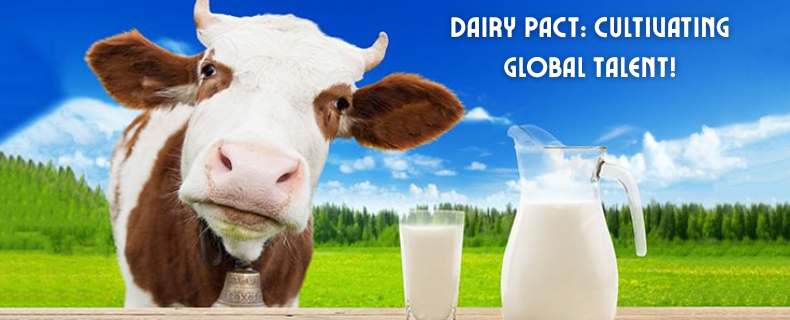
The Dairy Industry Labour Agreement: A Gateway for Skilled Overseas Workers
dina045850
The Australian dairy industry plays a crucial role in the country's economy, but finding skilled labour remains a persistent challenge. To address this, the Dairy Industry Labour Agreement allows employers to sponsor skilled overseas workers in key dairy farm occupations. This agreement provides pathways for temporary work (up to four years) and even permanent residency, ensuring that Australian dairy farms continue to thrive.
Who Can Employers Sponsor?
Under this agreement, employers can sponsor overseas workers for the following roles:
- Senior Dairy Cattle Farm Worker
- Dairy Cattle Farm Operator
These roles are critical in maintaining high-quality dairy production standards, and skilled workers are needed to fill the labour gap in regional areas.
Visa Options Available
Employers can sponsor skilled overseas workers under these visa subclasses:
- Skills in Demand Visa (Subclass 482)
- Employer Nomination Scheme Visa (Subclass 186) (after a three-year transition period)
- Skilled Employer Sponsored Regional (Provisional) Visa (Subclass 494)
Recognised Occupation Codes
Workers in these roles fall under the Australian and New Zealand Standard Classification of Occupations (ANZSCO) codes:
- Dairy Cattle Farmer (ANZSCO 121313): Focuses on farm management, cattle care, and milk production.
- Dairy Cattle Farm Worker (ANZSCO 841512): Supports farm operations, including feeding, milking, and equipment maintenance.
What Are the Responsibilities of Sponsored Workers?
Senior Dairy Cattle Farm Worker Duties:
Workers in this role oversee various aspects of dairy farm operations, including:
- Managing milk production processes
- Implementing reproductive programs and artificial insemination
- Supervising herd fertility management and calving procedures
- Managing pastures, livestock feeding plans, and animal welfare
- Operating and maintaining milking equipment and farm machinery
- Ensuring compliance with Australian food safety and animal welfare regulations
- Supervising junior farm workers and handling emergency situations
Dairy Cattle Farm Operator Duties:
Operators focus on practical, hands-on farm duties, such as:
- Operating milking plants and monitoring equipment performance
- Recording milk vat temperatures and cow identification numbers
- Performing general maintenance and farm machinery adjustments
- Assisting with artificial insemination and fertiliser application
- Contributing to team efforts and working independently when needed
English Language Requirements
To be eligible, skilled workers must meet minimum English language requirements, varying by visa subclass and regional location:
- Subclass 482 Visa:
- Category 1 regions: IELTS 5.0 overall, with at least 4.0 in each component
- Category 2 & 3 regions: IELTS 5.0 overall, no minimum per component
- Subclass 186 Visa:
- All regions: IELTS 5.0 overall, with at least 4.5 in each component
- Subclass 494 Visa:
- Category 2 & 3 regions: IELTS 5.0 overall, no minimum per component
Skills and Experience Requirements
For Senior Dairy Cattle Farm Workers:
- Option 1: An Australian Qualifications Framework (AQF) Certificate III (or equivalent) and at least 2 years of recent and relevant work experience
- Option 2: At least 3 years of recent and relevant work experience without formal qualifications
For Dairy Cattle Farm Operators:
- Option 1: An AQF Certificate II or III (or equivalent)
- Option 2: At least 1 year of recent and relevant work experience in place of formal qualifications
A short period of on-the-job training may be required in addition to formal qualifications.
Salary and Employment Requirements
Employers must meet the salary thresholds outlined in the agreement:
- For Category 3 regional locations, the salary must be at least 90% of the Temporary Skilled Migration Income Threshold (TSMIT) for Subclass 494 visas
- For Subclass 482 and 186 visas, it must be at least 90% of the Core Skilled Income Threshold (CSIT)
Additionally, sponsors must:
- Employ skilled workers on a full-time basis
- Comply with National Employment Standards if overtime is included
Age Requirements
- There is no age limit for the Skills in Demand Visa (Subclass 482)
- Applicants working in Category 1 regional areas must meet standard age limits for:
- Employer Nomination Scheme Visa (Subclass 186)
- Skilled Employer Sponsored Regional (Provisional) Visa (Subclass 494)
- Applicants in Category 2 and 3 regional areas must be under 55 years of age for the same visa types
Final Thoughts
The Dairy Industry Labour Agreement is a valuable opportunity for both employers and skilled overseas workers. It ensures a steady workforce for Australian dairy farms while providing a structured pathway for international talent to build their careers in Australia.
For further details, consult with Growmore Immigration, specialist to navigate the sponsorship process effectively.
Comments

Become a Growmore Community Member and Get Expert Support at Special Offer
schedule session with our RMA
